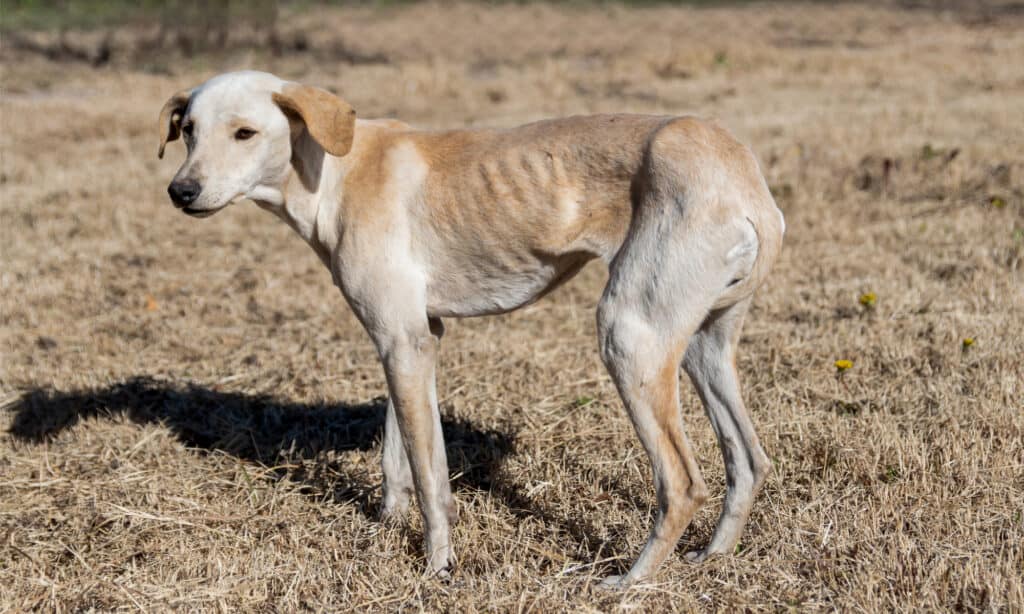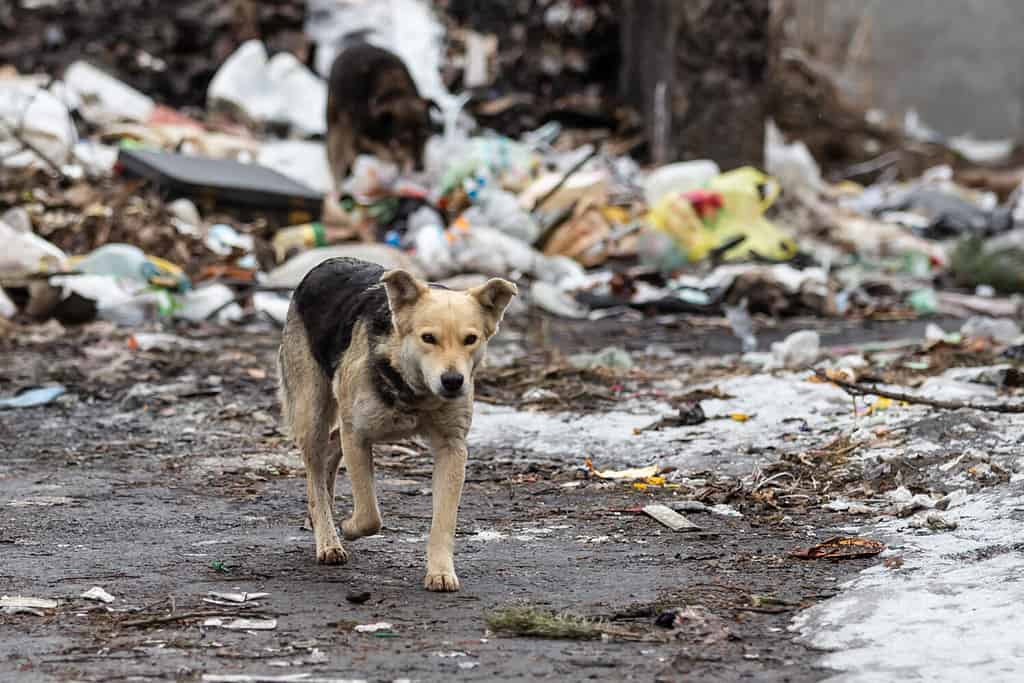People in the modern Western world deeply love their dogs. These animals bring tons of happiness. Pup owners treat their dogs like people, talking to them, sharing food with them, letting them sleep in their beds, and even sometimes dressing them in clothes.
Attitudes toward dogs differ in other cultures, though. They’re often seen as dirty, disease-bearing scavengers. Half-starved strays run in packs, steal food, and attack livestock and children. In poverty-stricken countries, people don’t have the resources for companion animals. This was the situation in the Middle East at the time the Bible was written. In this article, we’ll discover that most of what the Bible says about dogs is not complimentary. However, the Bible also finds ways to say “good dog” to our furry friends.

In poverty-stricken parts of the world, stray dogs are more often viewed with revulsion than compassion.
©iStock.com/Cristian Martin
Middle Eastern Dogs
Dogs were among the very first animals domesticated by human beings. Wild dogs today in Syria and Palestine look very much like jackals in their coloration and overall body shape. Some of the differences are that jackals are smaller than the largest wild dogs and have a different shape to their muzzles and ears. They tend to survive by scavenging and have learned to avoid people. They make a lot of noise barking and fighting at night.
In Bible times, some canines were kept as guard dogs to help protect and shepherd livestock. But people despised feral dogs as unclean animals that would eat any sort of filthy half-rotted thing they could find in the garbage or the graveyard.

The golden jackal is indigenous to the Middle East. It is smaller than most feral dogs.
©Stig Nygaard / Creative Commons – Original
Dogs as Insults in the Bible
Calling someone a “dog” was a great insult in Biblical times. Here are some examples:
- When someone insulted King David, one of his men asked for permission to kill that “dead dog” who dared to speak against the King.
- The Jews used the term “dog” as a derogatory term for Gentiles, whom they considered to be unclean.
- When David stepped onto a battlefield to fight the Philistine warrior Goliath, the larger man was insulted he was matched with a boy warrior. He asked, “Am I a dog, that you come at me with sticks?”
- In the New Testament, the term “dog” was used for those who are excluded from Heaven because of their false teachings, impurity, or greed.

The term “dog” in the Bible could refer to evil people who were excluded from the kingdom of Heaven.
©AB Photographie/Shutterstock.com
An Example of Disgraceful Behavior
Dogs are also used, sometimes literally and sometimes metaphorically, as examples of disgraceful behavior in the Bible.
- God instructed the Israelites not to eat meat that had been torn by wild animals, but to throw it to the dogs, who would eat such things.
- To be unburied and eaten by dogs was considered a disgraceful death. This was the fate of Jezebel, a pagan queen of Israel who persecuted the prophets of God.
- One of the wise proverbs of the Bible says, “As a dog returns to its vomit, so fools repeat their folly” (Proverbs 26:11).
- Proverbs 26:17 alludes to the vicious nature of dogs by saying a person who gets involved in a quarrel that has nothing to do with them is like a person who “grabs a stray dog by the ears.”
- Jesus once said, “Do not give dogs what is sacred; do not throw your pearls to pigs” (Matthew 7:6). This was a metaphor for not wasting time reasoning with people who have no spiritual understanding.
- Psalms 22:16 foreshadows the crucifixion of Jesus with these words: “Dogs surround me, a pack of villains encircles me; they pierce my hands and my feet.”

The Bible uses the behaviors of feral dogs as metaphors for degenerate human behavior.
©ANDRII KHRIAKOV/Shutterstock.com
An Expression of Humility
In the Bible, people expressed their deepest humility by referring to themselves as a dog, or worse yet, a dead dog.
- When King David decided to honor a disabled relative of his late friend with a permanent place at his table, the man was overwhelmed. He said, “What is your servant, that you should notice a dead dog like me?”
- After a prophet predicted he would do great things, a man named Hazael said, “How could your servant, a mere dog, accomplish such a feat?”

In the Bible, people expressed the most abject submission by referring to themselves as a “dead dog.”
©Sunshine Studio/Shutterstock.com
A Working, Helpful Creature
If all of this makes the Bible sound like a hopelessly anti-dog book, don’t judge it just yet. There are a few passages where dogs are mentioned in ways that are complimentary.
- Job, a suffering character in the Bible, mentions that he would not put some of his enemies with his sheep-herding dogs. The implication is that while the dogs did useful work, these men were so useless he wouldn’t trust them even to watch his sheep.
- The prophet Isaiah describes Israel’s spiritual “watchmen” as blind, ignorant, and like mute dogs: instead of barking a loud warning as good watchdogs do, these spiritual leaders laze around sleeping and dreaming while danger overtakes the nation.
- Jesus tests the faith of a Gentile woman who comes for healing for her daughter by saying “It is not right to take the children’s bread and toss it to the dogs.” She replies, “Even the dogs eat the crumbs that fall from their master’s table.” This exchange shows that dogs could have a place in the home. In response to her humble answer that demonstrated that Gentiles also had faith, Jesus granted her request.
- Two stories in the Bible describe dogs showing sympathy for ill humans. Job and Lazarus are two different characters whose bodies became infected with sores. In each case, dogs sat with these men in their pain and comforted them by licking their sores, as they would their own injuries. These “lowest of animals” showed greater compassion than the bystanders who did nothing to help.

The Bible tells how dogs tried to comfort and heal Job and Lazarus, men suffering from skin conditions.
©Daxiao Productions/Shutterstock.com
A Message of Hope
Finally, the Bible mentions dogs in a way that brings hope to those who despair of the meaninglessness of life. The author of Ecclesiastes enjoyed wealth, power, and pleasure of all sorts. In the end, he found them all to be empty. But he reflects, that as long as he is alive, there is still hope. After all, “even a live dog is better off than a dead lion.”

The world may be a better place if more people had the doggie qualities of love, joy, and hopefulness.
©Christin Lola/Shutterstock.com
“Bad Dog” or “Good Dog?”
In the Judeo-Christian tradition, God created all animals, including dogs, as part of an original perfect world. He valued Earth’s creatures enough to save representatives of each species in the Great Flood. So in that sense, all animals are worthy and good.
However, the Bible was written for people of a different time and culture, quite separate from that of modern-day Westerners. To understand the stories more fully, today’s readers may have to study what animals and objects meant in Biblical times. In the culture of that time and place, people widely viewed dogs with disgust, much like people today view sewer rats. The Bible used such cultural ideas to convey spiritual truths and draw contrasts between degenerate and noble behavior.
Today’s families do not usually face the same life-and-death survival issues as people of ancient times and they don’t often encounter dogs in a feral state. As a result, we are better able to appreciate the endearing qualities of domesticated dogs. Instead of being nuisances or objects of fear and hostility, dogs can actually inspire us with their positive qualities. Dog owners know their pets are deep wells of love, joy, hope, and faithfulness. The world would no doubt be a better place if more people acted like dogs in those ways. And to the extent we do so, we will not only be more “dog-like” in the best sense of the word, but more “God-like” at the same time.
Ready to discover the top 10 cutest dog breeds in the entire world?
How about the fastest dogs, the largest dogs and those that are -- quite frankly -- just the kindest dogs on the planet? Each day, AZ Animals sends out lists just like this to our thousands of email subscribers. And the best part? It's FREE. Join today by entering your email below.
Thank you for reading! Have some feedback for us? Contact the AZ Animals editorial team.








